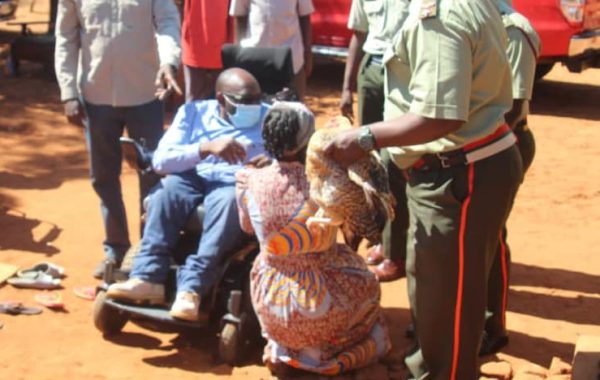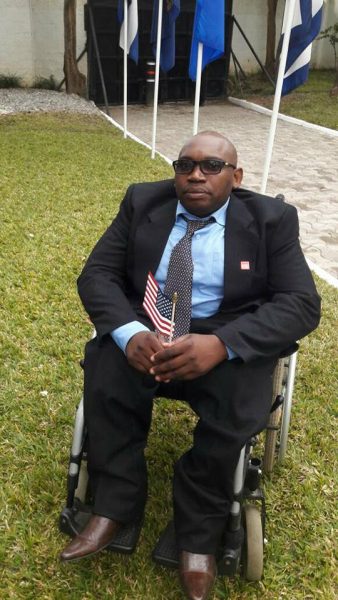“My passion is to advocate for the rights of people living with a disability.” These are the words of Miyoba Hamuhuma, human rights defender and Chief Executive Officer at Enlight Abilities, an organization in Zambia committed to the empowerment of people with disabilities. He decided to participate in Global Rights Connection, a participatory online training offered by Equitas, to increase his knowledge on human rights.
At eleven years old, Miyoba was diagnosed with polio, which paralyzed him from the waist down. To get to class with his wheelchair, he needed help from his friends. “My class was on the third floor, and there was no lift. I had to be lifted manually from Monday to Friday, for three years!” However, this did not stop him from pursuing his studies and expanding his knowledge – Miyoba’s academic background today includes computer science, social work, business, rehabilitation and disability administration.
Nonetheless, those three years of relying on his friends to go to class made one thing very apparent – schools in his community lacked accessibility for people with physical disabilities. Yet it is when he began working at Cheshire Homes Society of Zambia, an NGO that fosters the independence of people  with disabilities, and saw the realities of families with disabled children, that his desire to strive for the respect of their human rights sprouted.
with disabilities, and saw the realities of families with disabled children, that his desire to strive for the respect of their human rights sprouted.
“The passion came into me after seeing how marriages were breaking after having a child living with disability and how mothers would struggle, sometimes to the point of taking one’s life*. Because in Zambia, having a child with a disability is badly perceived.” These terrible consequences ignited his commitment for disability advocacy itself, when he realized that people living with disabilities are can be disconnected from society and not being given the same opportunities.
Today, through Enlight Abilities, Miyoba supports children living with disabilities, physical, intellectual or neurological, as well as their families, by providing devices such as wheelchairs, ramps, accessible toilets, as well as social services to enable their access to school and offering training for their relatives and teachers on inclusivity and advocacy. “Our aim is to break barriers, and our specific focus is to support disabled children so they can go to school.” Enlight Abilities also helps parents understand the rights of their children and lobbies for the creation of laws and policies that ensure schools are accessible for all.
The organization also looks at the aspect of water sanitation, another issue that particularly affects people with disabilities in often-unknown ways. In a number of Zambian communities, access to clean water is by hand water pumps, particularly in rural areas. The pumps are often out of reach for disabled people, either because their usage is not accessible, or because of their location far from people’s homes. Miyoba explains that this sometimes leads to people with disabilities to collect water from dams or streams, which entails a high risk of contamination and transmission of diseases. They’re often unaware of the consequences due to the lack of access to information.
 It is because of his strong belief in the right to education that Miyoba joined Global Rights Connection, a virtual training intended for human rights educators to strengthen their skills in carrying out initiatives to foster positive social change in their communities. For Miyoba, the training was an enriching journey that gave him the opportunity to learn about different approaches to human rights education, and reinforced his appeal on the importance of accessible schools.
It is because of his strong belief in the right to education that Miyoba joined Global Rights Connection, a virtual training intended for human rights educators to strengthen their skills in carrying out initiatives to foster positive social change in their communities. For Miyoba, the training was an enriching journey that gave him the opportunity to learn about different approaches to human rights education, and reinforced his appeal on the importance of accessible schools.
“I am very keen on education, but it is unfortunately not equal. I am able to participate in this program because I have been able to go to school. For me, education is the key to advance human rights.”
Miyoba believes that Global Rights Connection has made him more cognizant of human rights education and the human rights-based approach. To him, these are essential tools for empowerment of children living with disabilities, as much as for their independence as their own health and security:
“People with disabilities represent marginalized communities that are affected by human rights issues more than any other group in Zambia. If you look at the current local situation, the education level of people with disabilities is still very low. A lot of them do not know about their own rights – so even when they experience abuse, they sometimes do not realize it.”
Therefore, Miyoba feels as though there is more to do to empower people with disabilities to be independent, and to understand their rights. Miyoba plans on continuing to advocate for the rights of people with disabilities to reach their full potential.